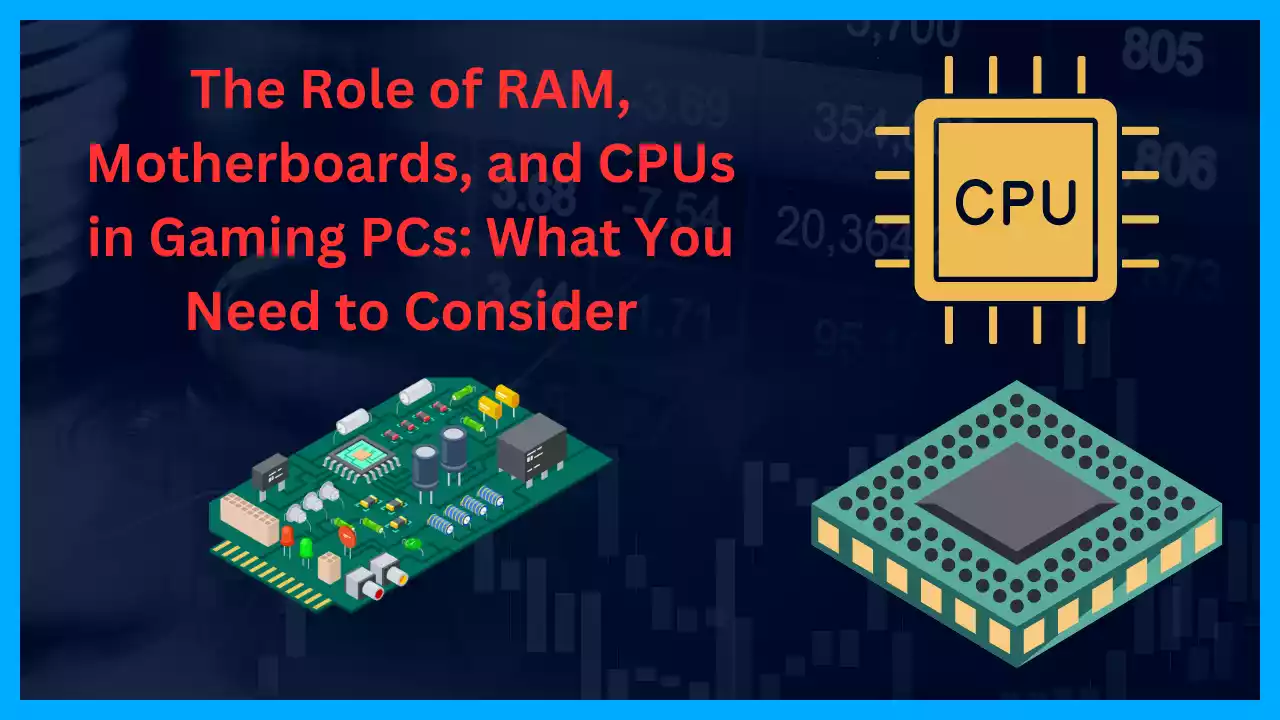In the ever-evolving landscape of gaming, where graphics push the boundaries of realism and gameplay demands swift responsiveness, the trifecta of RAM, motherboards, and CPUs stands as the bedrock upon which performance is built. Assembling a gaming PC isn’t just about picking the latest and greatest graphics card; it’s about understanding how these essential components harmonize to deliver the ultimate gaming experience. In this article, we delve deep into the intricacies of RAM, motherboards, and CPUs, unraveling their roles and highlighting crucial considerations for gamers.

The Crucial Role of RAM
Random Access Memory (RAM) serves as the transient memory where data is temporarily stored for quick access by the CPU. In gaming, RAM plays a pivotal role in ensuring smooth gameplay and swift multitasking. Here’s what you need to consider:-
1. Capacity Matters: While 8GB was once considered sufficient, modern gaming demands more. Aim for at least 16GB to accommodate the demands of contemporary titles. For enthusiasts or those venturing into streaming and content creation, 32GB or even 64GB can future-proof your system.
2. Speed Isn’t Everything, But It Helps: RAM speed, measured in MHz, influences data transfer rates. Faster RAM can enhance overall system responsiveness and improve frame rates, especially in CPU-bound scenarios. Aim for DDR4 modules with speeds ranging from 3000MHz to 3600MHz for optimal performance without breaking the bank.
3. Dual-Channel Configuration: Motherboards supporting dual-channel memory configurations offer improved memory bandwidth, translating to better performance. Ensure your motherboard supports dual-channel memory and install RAM modules in pairs to unlock this potential.
Unraveling the Motherboard Maze
The motherboard acts as the central nervous system of your gaming rig, facilitating communication between all components. When selecting a motherboard, consider the following factors:-
1. Socket Compatibility: Your choice of CPU dictates the motherboard socket type. Whether it’s AMD’s AM4 or Intel’s LGA 1200, ensure compatibility to avoid compatibility issues.
2. Form Factor: Motherboards come in various form factors, including ATX, Micro-ATX, and Mini-ITX. Consider your PC case size and expansion needs when selecting a form factor. ATX offers ample expansion slots, while Mini-ITX caters to compact builds.
3. VRM Quality: Voltage Regulator Modules (VRMs) are crucial for stable power delivery to the CPU, especially during overclocking. Opt for motherboards with robust VRM designs and adequate heatsinks for sustained performance.
4. Expansion Slots and Features: Consider the number of PCIe slots for graphics cards, M.2 slots for SSDs, USB ports, and other features based on your gaming and expansion requirements.
The Heartbeat of Performance: CPUs Decoded
The CPU serves as the brain of your gaming PC, executing instructions and processing data to deliver seamless gameplay. Here’s what you need to know when selecting a CPU:-
1. Core Count and Clock Speed: Gaming performance benefits from higher core counts and clock speeds, especially in CPU-intensive titles. Aim for CPUs with at least four cores and high boost clock speeds for optimal performance.
2. Multithreading Support: Hyper-Threading (Intel) or Simultaneous Multithreading (AMD) enables CPUs to execute multiple threads per core, improving multitasking and overall system responsiveness.
3. Overclocking Potential: Enthusiasts seeking to squeeze every ounce of performance can opt for unlocked CPUs and overclocking-friendly motherboards. However, ensure adequate cooling and power delivery for stable overclocks.
4. Future-Proofing: Consider investing in CPUs with higher core counts and newer architectures to future-proof your system against evolving gaming requirements and software demands.
Conclusion
In the realm of gaming PCs, the synergy between RAM, motherboards, and CPUs is paramount for unlocking unparalleled performance. By understanding the roles of these components and making informed choices based on your gaming needs and budget, you can embark on a journey of building the ultimate gaming rig. Whether you’re chasing high frame rates, immersing yourself in virtual worlds, or conquering the competitive landscape, the nexus of RAM, motherboards, and CPUs lays the foundation for gaming greatness.
